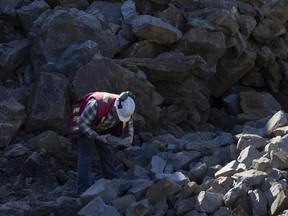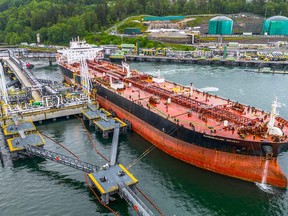Ottawa needs to remind Trump that Canada’s critical minerals are more accessible to the U.S., miners say
Article content
Some Canadian miners say they won’t be “losing sleep” over the possibility of tariffs being levied by the United States on critical minerals due to the immense demand for them from Europe and other regions, but they do want Ottawa to use these “tense times” to quickly resolve the sector’s permitting troubles.
Article content
Article content
It takes about 10 to 15 years to build a mine in Canada today, given the time it takes to explore deposits, get the required permits, look for investments, build infrastructure in rural areas and figure out a profitable way to extract the minerals.
Advertisement 2
Article content
The federal government has been working with the mining industry to eliminate unnecessary hurdles and speed up the permitting process, but more needs to be done, miners say.
“We have to start to do things more seriously and accelerate permitting, diversify our markets, bring down internal trade barriers … and actually try to sort of restart Canada,” Pierre Gratton, chief executive of the Mining Association of Canada, said. “Because we’ve been slumping. That could be the silver lining in what is otherwise a very, very tense time.”
Ottawa needs to keep reminding United States President Donald Trump that Canada’s critical minerals are more economically accessible for U.S. manufacturers, he said.
“We are what enables their manufacturing sector,” he said. “These tariffs will make their manufacturing sector less competitive. So, it makes no sense to me.”
The 25 per cent tariff that was set to be imposed on Canadian products in the U.S. on Feb. 4 was delayed by a month after Canada promised to take sterner action against supposedly high illegal migration and drug smuggling from its end. With two more weeks to go, Trump hasn’t shown any signs of pulling back on tariffs.
Article content
Advertisement 3
Article content
But Mark Selby, chief executive of Toronto-based Canada Nickel Co. Inc., said he isn’t “losing any sleep” over the potential tariffs.
“Anything we can’t sell to the U.S., we will easily be able to sell to Europe,” he said.
In 2023, Canada produced about 4.5 per cent of the world’s nickel and almost half of that was exported to the U.S., according to Natural Resources Canada, with 14 per cent going to the Netherlands, seven per cent to China and six per cent to Japan. Nickel is used to make stainless steel and batteries, including those that power electric vehicles.
Selby’s company doesn’t produce any nickel at the moment, but it is developing a nickel deposit in Timmins, Ont. The company’s journey is an example of just how long it takes to build a mine in Canada.
If it gets the required funds and permits and meets its target of producing the commodity from 2027 onwards, then the entire process of constructing the mine would have taken six years, which would be something of a “modern-day record,” Selby said.
Gratton agrees that Canadian miners will be able to find other customers for some of their commodities, but he also cautions that that could come at a cost since the U.S. is Canada’s top trading partner for critical minerals.
Advertisement 4
Article content
In 2023, Canada exported 59 per cent of its total critical minerals to the U.S. and that accounted for about $29.8 billion.
But Gratton said other regions such as Europe “keep asking for more” of these materials, which are considered key to building electric vehicles and other products needed to power the energy transition away from fossil fuels.
“It’s not like the U.S. pays us more per pound than any other place,” he said. “It’s the same price no matter where you go.”
However, Gratton said one potential global effect of a tariff war is that it could make everything much more expensive and lower demand. In that case, some mining operations could be forced to shut down.
The importance of these materials came to the fore once again on Feb. 7, when Prime Minister Justin Trudeau was overheard telling business leaders that Trump was serious about making Canada the 51st state and that he was eyeing the country’s critical minerals.
But while Canada contains a lot of the reserves of metals that are needed to build electric vehicles, it currently doesn’t mine or produce many key metals in abundance. For example, Canada is a significant producer of nickel, cobalt, uranium and potash, but doesn’t produce much lithium, graphite or rare earths.
Advertisement 5
Article content
As such, industry insiders point out that Trump’s desire to annex Canada wouldn’t immediately boost production of critical minerals. Instead, the U.S. can just rely on other countries such as Argentina and Chile, which combined produce about 35 per cent of the world’s lithium.
Recommended from Editorial
-

Why Trump wants to buy Greenland
-

Trudeau ‘wish list’ fell short for miners
Canada produces some graphite, but it produced just 0.3 per cent of the world’s total in 2023, according to government data.
“It is a bit of an illusion to think that you could just annex Canada and all of a sudden these minerals would emerge from the ground,” Gratton said. “Even if Trump changes the (U.S.) constitution and gets to run again, some of what he’s seeking still won’t be coming out of the ground because it takes time to build.”
• Email: nkarim@postmedia.com
Bookmark our website and support our journalism: Don’t miss the business news you need to know — add financialpost.com to your bookmarks and sign up for our newsletters here.
Article content
Miners not losing sleep over Trump’s tariff threat
2025-02-18 11:00:07







